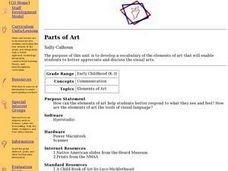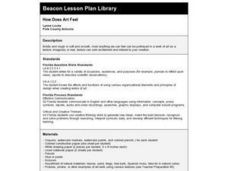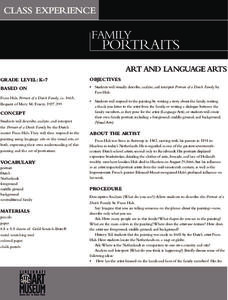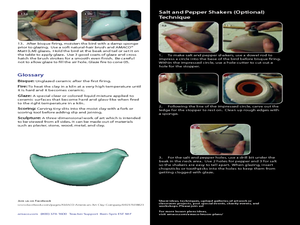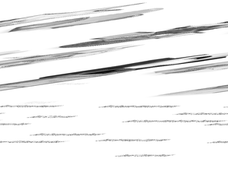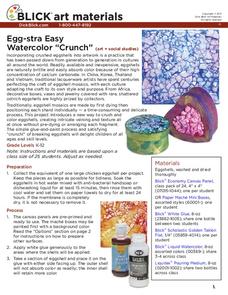Curated OER
Parts of Art
Young scholars define and use new vocabulary associated with the elements of art. As a class, they brainstorm different ways in which we communicate with one another. In groups, they view different pieces of art from the Native American...
Curated OER
Pen and Ink Drawing
Learners hone their drawing techniques to create a nature-inspired piece of art. They practice hatching, cross hatching, stippling, and shading. They discuss how each method is better suited for creating specific elements in nature such...
Endangered Species Coalition
Endangered Species Day Art
Albrecht Durer created a highly textured stamp or print of a rhinoceros. To better understand which animals are near extinction, upper graders create similar prints of endangered animals they've researched. The six-day lesson includes...
Curated OER
Talking Rocks
Artists imitate the symbols used by tribes of the Southwest or use their own word pictures that communicate something about themselves. This lesson is a perfect blend of visual art and social studies. Students create a beautiful piece of...
Curated OER
How Does Art Feel
Students examine a variety of textures, one of the seven elements of design. They experiment with various media and techniques to produce different textures. Then they produce two works of art, one using actual textured material and one...
Curated OER
Texture Rub/Texture Board
Students work hands on finding and using different textures in an interior. They recognize different textures throughout the classroom and apply that knowledge of different textures while designing and texture-rich room on their...
Curated OER
The Art Box
Sixth graders create a 3-D Art Box in this design-oriented art project for the 6th grade. Rubric is included for grading purposes. The elements of design are covered and applied (includes line, form, texture, shape, value, color, and...
Curated OER
Looking and Learning in the Art Museum
Students practice looking skills as they reflect upon the differences between viewing original works of art and reproductions. In this art viewing lesson, students interpret a work of art using formal analysis and research done for...
Curated OER
Family Portraits
Pupils discuss, analyze, and interpret "Portrait of a Dutch Family" by Fans Hals and then create subject specific projects for assessment. This cross-curricular lesson plan is well-suited for Language Arts or Visual Arts classrooms and...
Curated OER
Fiber Fusion
Create works of art using fabric. Learners use fabric, tissue paper, acrylic gel, and paint to create a unique and interesting piece of work. They discuss the different techniques that can be used to create works of art and evaluate...
Curated OER
Burlap Weaving Gone Wild
Explore art using fabric with this resource. Learners talk about weaving and create art work after discussing this important technique. This is a great way integrate art and history.
Curated OER
A Glimmer of Beauty: Lesson Plan
Fully analyze the elements of art and unexpected beauty in the William Merritt Chase's Still Life with a Fish. The class will examine the painting very closely, then use photography to express unexpected beauty in still life. This is a...
J. Paul Getty Trust
Still-Life Painting: Arranging Nature—Lesson 1
Art learners examine still-life arrangement images and respond to a series of prompts. In a whole-class discussion, pupils list elements and qualities that still-life paintings can have. After instructors create an arrangement and model...
Curated OER
Clay Wipe Away: Ceramics
Discuss Pre-Colombian South American art with your class, then get out the clay and create some. Pupils practice using the wipe-away technique to create a ceramic tile similar to those made by the Maya. Great web links and a...
Curated OER
Informed Drawing Through Observation
Young scholars practice observation techniques to improve their drawing skills. In this drawing technique lesson, students assess drawing as an art media and discuss realism. Young scholars view examples of animal drawings and practice...
Curated OER
WPA Art and Visual Elements of Art
Students recognize the following formal elements om art: visual and tactile texture; shape or contour; value. They create a 2-D or 3-D work of art that embodies this element strongly.
Curated OER
Have Fun With Paint
Students explore different painting techniques. In this visual arts lesson, students use various materials to create different textures in their paintings. Students use wax paper and foam boards to create unique art pieces.
Curated OER
VISUAL ARTS
Young scholars learn the historical context of mask-making explore the elements of the art form.
Curated OER
Create a Flock of Birds One Pinch at a Time
Students create Mexican Pottery Clay project. In this natural history/art lesson students construct their own clay bird. Students make connections between visual arts and reading to follow directions. Students also reflect on the...
Armory Center for the Arts
Place Value Collage
How can art represent math? Use a lesson on place value collages to illustrate the different meanings that numbers have in their designated places. Kids observe photographs and paintings that show place value, then work on their own.
Curated OER
Abstract Planes in Paper Sculpture
High schoolers create maquettes of abstract sculptures utilizing the elements of art; line, shape, value, color, space and texture and the principles of design; balance, emphasis, contrast, rhythm and movement, pattern and unity. These...
Curated OER
Figurative Slot Sculptures
Middle schoolers create 3-dimensional works of art in the form of slot sculptures. I love this lesson plan, because it exposes students to a completely different form of art. Everything you need to do to successfully-implement this...
Dick Blick Art Materials
Egg-Stra Easy Watercolor “Crunch”
It doesn't have to be Easter to enjoy this egg-stra fun art project. Kids crunch egg shells, saturate them with color, and glue them to boxes or other objects to make egg-stra special gifts.
Curated OER
Design and Texture
Students experience how texture is one of the six basic elements of design. It gives an image authenticity and 'flavor'. It invites the audience to enter a piece and encourages each viewer to experience rather than simply observe.


